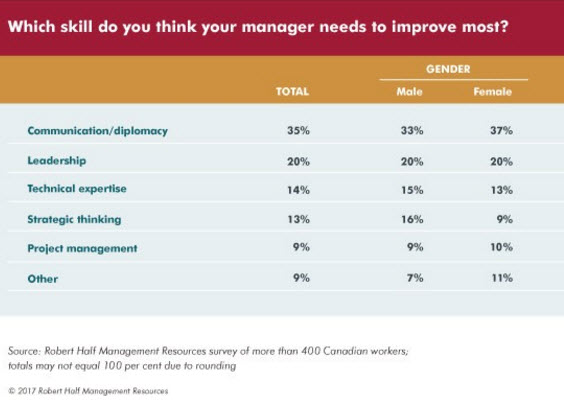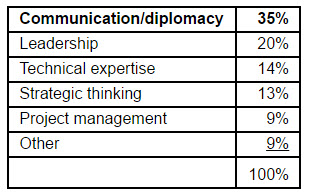Raise your hand if you’ve been witness to a workplace conversation that goes something like this?
Employee: I wish you had checked with me before making the decision.
Manager: I just assumed that it worked for you.
Employee: It puts me in a difficult position with the team.
Manager: Don’t worry. I’ll talk to them.
Employee: Ok. (a.k.a., I’ll believe it when I see it)
If your hand shot up, you’re in the majority.
A recent Robert Half survey of 400 Canadian workers showed communication and diplomacy as the skills workplace managers need to improve most. The results aren’t even close. Communication and diplomacy won by a landslide.
The survey results aren’t a surprise to me. I’m guessing they aren’t a total surprise to you, either.
Employees expect their managers, as workplace leaders, to be effectual communicators, mediators of workplace interpersonal issues, and facilitators of positive team dynamics. That may be a lot to ask of a manager, yet its’ what employees want, even in a non-hierarchical workplace.
Communications is a base element of collaboration
Many of the workplace problems we face are complex. They require collaboration, often among diverse people, to solve.
My view is that effective communication is a base element of collaboration success. If there was a periodic table for collaboration, communication would be right at the top, element #1. If we aren’t communicating well, we have little chance at succeeding with collaboration.
Whenever I give a talk on the topic of collaboration, I almost always start off with some points on communication.
How can we collaborate if we aren’t on the same page? Doubling down on that thought – how can managers get others to collaborate, from the same page?
Conflict as proxy for poor communications
Communication literally means to make “common”; to get on the same page with someone else.
My observations, as a mediator of scores of workplace-related conflicts, is that a communication breakdown is, as often as not, at the source of the conflict. Often, the stated conflict, e.g., “he didn’t follow the rules”, is proxy for what really galls the person; e.g., their irritation in not being able to authentically dialogue with the other person.
Of course, when you reflect for a moment, stated conflict as proxy for an unstated need is a scenario that plays out in any type of relationship; family, business, community. Scary thought, maybe?
Diplomacy is a negotiating skill
Merriam-Webster defines diplomacy as:
- the art and practice of conducting negotiations between nations
- skill in handling affairs without arousing hostility; e.g., “she handled the awkward situation with diplomacy”
By any definition, diplomacy involves negotiation, and tact.
In the workplace, differences are bridged and consensus is built through negotiation. Negotiation acumen is essential.
Diplomacy in the workplace speaks to our negotiation style. How do we resolve differences? How do we relate to each other? How do we lead?
Three ways to improve your communications and diplomacy skills
There are tons of ways to improve communications and diplomacy skills. Here’s three I’ve found helpful:
- Increase self-awareness. Assessment instruments, such as Myers & Briggs and Conflict Dynamics Profile (my tool of choice) can give you a benchmark to journey from.
- Take a negotiations course. Negotiation is a learned skill. Get the rudimentaries down. Improvise from that base.
- Brush up on your context(s). Communications happens in context. Language, culture, and (safe) environment are pre-conditions for effective communications. Each context is different. Do your homework. Step to the other’s side. Get to know their world(s). Heck, maybe even go there?
The bonus of learning communication skills is that they are transferable.
Thank goodness.



Speak Your Mind